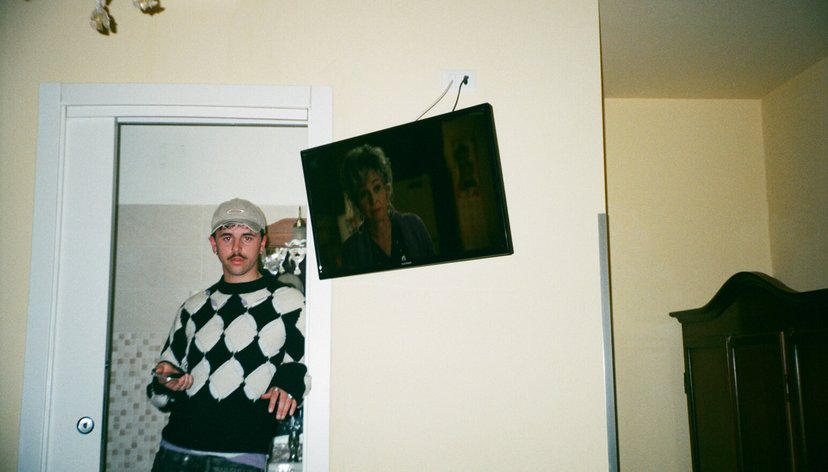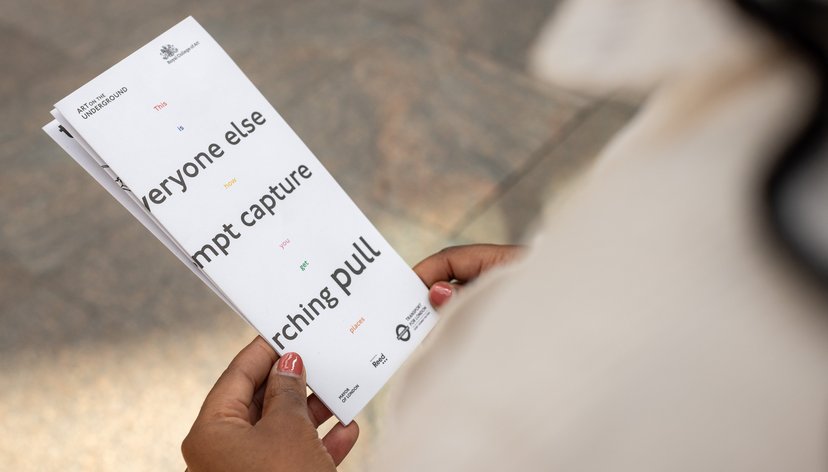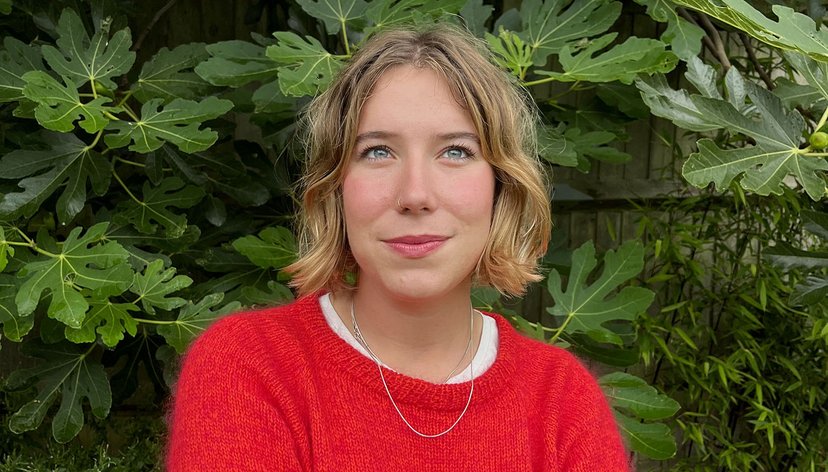
Key details
Date
- 4 December 2024
Read time
- 7 minutes
Read an extract of writing and interview with Gazelle Mba, the Royal College of Art Writing MA graduate merging oral history, reportage, and memoir to explore Nigeria’s recent history.
Key details
Date
- 4 December 2024
Read time
- 7 minutes
“It made me a better and braver writer and for that I’ll always be grateful.”
Writing MA alumni
Gazelle Mba (Writing MA, 2024) is an award-winning Nigerian writer. Before coming to the RCA she studied BA English Literature at the University of Oxford and MPhil Criticism and Culture at the University of Cambridge. She worked as an editor and writer, with articles published by London Review of Books, The World of Interiors, British Journal of Photography, Frieze, and Dazed.

For her Independent Research Project – the culmination of the Writing MA – Gazelle wrote about Nigeria in the 1990s. She is now developing this into a narrative non-fiction book exploring ideas of nationhood, belonging, identity, and memory.
Gazelle was the joint winner of the annual Writing Prize, awarded to graduating students that show great ambition. Discussing her work, Jeremy Millar, Head of Programme, Writing MA, commented: “Although Gazelle’s project is broad in scope – about a country large and populous, troubled and striving – it never stops paying attention to the small and the particular, for it knows that this is where lives are lived, and where history takes place. It is a thrilling piece of work, moving and enraging, and I look forward to us all being able to read it more fully.”

Happy Survival by Gazelle Mba
My mother is lying across from me in her bed, her swollen left leg bandaged and propped up, the top half of her body supported by a fortress of pillows. I am seated on a green plastic chair like her psychoanalyst or her priest, my left hand cradling the side of my face. She has not slept in this bed for 18 months, not since the accident. The fact of her presence makes the room new again, unsettles the dreariness that clings to it. She wears a threadbare cotton nightgown, yellow with white flowers on its neckline, a gift from my father and her ex-husband. It looks almost as old as I am. My mother is partially obscured by the shadowed room, this room so undisturbed by morning light. She looks at me, a half-smile on her face. I watch her lie there, not fully asleep but not quite awake. The rise and fall of her chest is the only movement. We stayed together like this for a long time.
*
November 18th 2020. Benin airport, Edo state. Northeastern winds wrap the city in thick layers of dust which make it hard to see, harmattan haze they call it. My mother is about to board a private bus with her friends. They are on the way to a funeral. It is getting late and the general consensus among the women is that it would be better to drive to their destination in Akure, the largest city in nearby Ondo state so they could stay in a hotel rather than find somewhere in Benin. My mother agrees, she gets in the bus and they start driving. What happens next is half-remembered. I occasionally try to insert myself into this moment, so that at least in my mind she would not be alone. I imagine she places her head against the window, or laughs at one of her friends’ jokes. They are talking about the kind of thing women their age do, the couple divorcing after a cheating scandal, what their children are up to, my mother’s new promotion. Her legs are cramping from all that sitting down. The journey is long and the roads are bad: potholes, low visibility, no lights. Massive Dangote trucks amble impolitely beside smaller vehicles, one truck moving a little too close. Next an uncomfortable silence, followed swiftly by a woman’s screams. The sound rips a hole in the night. A week later I read in the news report that the truck driver lost control of the vehicle and collided into their car. The smaller vehicle was crushed, like an ant beneath my finger. The bereaved struggled to identify the remains of their family members. A few scattered teeth, clumps of hair, bloodied strips of clothing. My mother was one of two survivors.

“Through my book I am attempting to ask, and answer, big questions: how can we remember things we do not directly experience?”
Writing MA alumni
Could you provide some context for this extract?
This extract comes from the prologue of my current book project. I began writing it shortly after my mother almost died in a car crash in late 2020, around the time of the EndSARS protests and the Lekki massacre in Nigeria. [EndSARS was a series of mass protests against police brutality in Nigeria that called for the end of the Special Anti-Robbery Squad (SARS), a unit of the Nigerian Police known for its abuse against Nigerian citizens.]
My mother’s broken body and the irreplaceable loss of her friends who died were the result of the deplorable roads found across the country. What I have taken to calling ‘my miscarried grief’ was connected to the bad governance and lack of political accountability that Nigerians were killed for protesting against. That intense period of national mourning sparked a deep personal reflection on themes of nationhood, belonging, identity, and memory. These themes now form the core of my book, a work of literary nonfiction focused on Nigeria in the 1990s.
“I’m considering what Nigeria might have to teach the world about a postcolonial nation’s ongoing struggle for democracy.”
Writing MA alumni
The book is my way of confronting the silences surrounding the legacy of military rule, particularly under General Sani Abacha’s regime. I believe these unspoken histories contribute significantly to the challenges Nigeria faces today. With an eye to the subconscious imprint of military rule that survives today, and through interviews with key politicians, activists, and journalists from that time, I aim to revive and explore this crucial period of our history.
Through my book I am attempting to ask, and answer, big questions: how can we remember things we do not directly experience? How does Nigeria’s history of military rule and fraught democratic transition speak to, contradict or challenge those of other countries with a similar fate: Chile, Algeria, South Africa, Indonesia, Haiti, The Balkans? I’m considering what Nigeria might have to teach the world about a postcolonial nation’s ongoing struggle for democracy.
This project merges oral history, reportage, and memoir. I initially set this essay aside after struggling to get it right, but when I rediscovered it, I realised it captured the essence of everything I had been trying to articulate. It’s my calling card – a look at how individual, personal stories intertwine with larger historical narratives. I write this way because, as Madeleine Thien said, “literature tries to hold, even fleetingly, what time and history dissolve.”
Why did you decide to write about this and how was it supported by the Writing MA programme?
I’m not sure if I chose to write about this topic or if it chose me. In some ways, I think I've been writing this book for most of my life. Looking back on my writing, the themes of family, human relationships, and their intersections with social and political issues reappear again and again.
As an only child, with a lot of cousins and half-siblings, I suppose one of my central preoccupations is how the individual relates to the collective. In my writing I distil something of that formative conflict. I think writing offers the promise, as yet unrealised, of reconciliation. So I ask myself, what does it mean to be a citizen? What does it mean to belong? How does the experience of nationhood shape literature? These are the questions that keep me up at night.
“The Writing MA programme made me believe in the viability of this project. While studying on the course I felt like I wasn’t just shouting into the void; instead, there were people shouting alongside me.”
Writing MA alumni
The Writing MA programme made me believe in the viability of this project. While studying on the course I felt like I wasn’t just shouting into the void; instead, there were people shouting alongside me. For 12 months, I had access to ears and minds that were receptive to my work. Their encouragement and advice inspired me to keep pushing the project forward. It made me a better and braver writer and for that I’ll always be grateful.
What motivated you to join the Writing MA at the RCA?
The idea of writing a book has been with me since I was 12 years old and grew stronger through my early 20s. Life’s demands, though, often pushed that dream aside. I felt that I needed to do something more ‘corporate’ and respectable. Enrolling in the MA was my way of finally saying ‘yes’ to that deep desire, and giving it the priority it deserved.
“An art school has a particular kind of freedom and openness that I found invigorating, offering a space where I could immerse myself fully in writing as an art form.”
Writing MA alumni
I chose the RCA’s Writing MA specifically because it’s one of the few programmes in the country focused on nonfiction writing. I was also drawn to the unique environment of an art school, so different from the traditional academic settings I’d been used to. An art school has a particular kind of freedom and openness that I found invigorating, offering a space where I could immerse myself fully in writing as an art form.
In what ways did the Writing MA programme help to develop your writing practice?
The Writing MA allowed me to take risks with my work in ways I hadn’t experienced before. Since I wasn’t writing to please an editor, or meet the requirements of a publication, I could play with form and voice in a more direct way.
One particularly impactful experience was writing a piece of cultural criticism on Cleo Sol. It was unlike anything I’d written before – I used a vignette structure, using the first person I spoke candidly about my experience of the artist's work – but in hindsight, it was foundational, an experience that opened my mind to possibilities within my practice. Each time I ventured out of my comfort zone writing wise, I noticed how much fun I was having and how free I felt. Most of my training had been as a critic and I’d prematurely imbibed a critical voice that I occasionally found to be harsh and restraining. But over the 12 months spent on the course, I definitely felt the inner ‘critic’ voice soften and the playful ‘writer’ voice get louder and more confident.
“Each time I ventured out of my comfort zone writing wise, I noticed how much fun I was having and how free I felt.”
Writign MA alumni
I also learned practical skills, like writing a book proposal, which has been invaluable. But even more important was the courage I developed. I learned to be brave, to ‘fail forward’, and to view writing as a space for both learning and unlearning. In essence, sometimes you are sitting on a project or an idea and you’re on the fence. You just need someone to tell you to push the button and RCA Writing was that for me.
This year of taking my writing seriously revealed just how central it is to my identity and worldview. Before, I tried to keep writing on the periphery of my life, something I would always do on the side. But through the programme, I started to think about what my life might look like if I kept writing as an art form at the core of who I am.
I met so many amazing artists who took their work very seriously, and were ambitious and bold and daring. They inspired me to no end. That realisation, that writing is my way of making sense of the world, and that I must devote myself to it, has been transformative. I’m grateful to the RCA for nurturing that understanding and helping me embrace it fully. I hope you find your button pushers when you need it.
“I learned to be brave, to ‘fail forward’, and to view writing as a space for both learning and unlearning.”
Writing MA alumni



